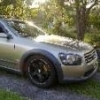M35 Stagea Vs Ve Sportwagon
Announcements
-
Similar Content
-
Latest Posts
-
By joshuaho96 · Posted
This has clearly gone off on quite a tangent but the suggestion was "go standalone because you probably aren't going to stop at just exhaust + a mild tune and manual boost controller", not "buy a standalone purely for a boost controller". If the scope does in fact stop creeping at an EBC then sure, buy an EVC7 or Profec or whatever else people like to run and stop there. And I have yet to see any kind of aftermarket boost control that is more complicated than a PID controller with some accounting for edge cases. Control system theory is an incredibly vast field yet somehow we always end up back at some variant of a PID controller, maybe with some work done to linearize things. I have done quite a lot, but I don't care to indulge in those pissing matches, hence posting primary sources. I deal with people quite frequently that scream and shout about how their opinion matters more because they've shipped more x or y, it doesn't change the reality of the data they're trying to disagree with. Arguing that the source material is wrong is an entirely separate point and while my experience obviously doesn't matter here I've rarely seen factory service manuals be incorrect about something. It's not some random poorly documented internal software tool that is constantly being patched to barely work. It's also not that hard to just read the Japanese and double check translations either. Especially in automotive parts most of it is loanwords anyways. -
If you are keeping the current calipers you need to keep the current disc as the spacing of the caliper determines the disc diameter. Have you trial fitted the GTS brakes fit on a GTSt hub or is this forward planning? There could be differences in caliper mount spacing, backing plate and even hub shape that could cause an issue.
-
By Godzillaskizza · Posted
Hi there I have a r33 gts with 4 stud small brakes, I'm going to convert to 5 stud but keep the small brakes, what size rotor would I need? -
First up, I wouldn't use PID straight up for boost control. There's also other control techniques that can be implemented. And as I said, and you keep missing the point. It's not the ONE thing, it's the wrapping it up together with everything else in the one system that starts to unravel the problem. It's why there are people who can work in a certain field as a generalist, IE a IT person, and then there are specialists. IE, an SQL database specialist. Sure the IT person can build and run a database, and it'll work, however theyll likely never be as good as a specialist. So, as said, it's not as simple as you're thinking. And yes, there's a limit to the number of everything's in MCUs, and they run out far to freaking fast when you're designing a complex system, which means you have to make compromises. Add to that, you'll have a limited team working on it, so fixing / tweaking some features means some features are a higher priority than others. Add to that, someone might fix a problem around a certain unrelated feature, and that change due to other complexities in the system design, can now cause a new, unforseen bug in something else. The whole thing is, as said, sometimes split systems can work as good, and if not better. Plus when there's no need to spend $4k on an all in one solution, to meet the needs of a $200 system, maybe don't just spout off things others have said / you've read. There's a lot of misinformation on the internet, including in translated service manuals, and data sheets. Going and doing, so that you know, is better than stating something you read. Stating something that has been read, is about as useful as an engineering graduate, as all they know is what they've read. And trust me, nearly every engineering graduate is useless in the real world. And add to that, if you don't know this stuff, and just have an opinion, maybe accept what people with experience are telling you as information, and don't keep reciting the exact same thing over and over in response.
-
By joshuaho96 · Posted
How complicated is PID boost control? To me it really doesn't seem that difficult. I'm not disputing the core assertion (specialization can be better than general purpose solutions), I'm just saying we're 30+ years removed from the days when transistor budgets were in the thousands and we had to hem and haw about whether there's enough ECC DRAM or enough clock cycles or the interrupt handler can respond fast enough to handle another task. I really struggle to see how a Greddy Profec or an HKS EVC7 or whatever else is somehow a far superior solution to what you get in a Haltech Nexus/Elite ECU. I don't see OEMs spending time on dedicated boost control modules in any car I've ever touched. Is there value to separating out a motor controller or engine controller vs an infotainment module? Of course, those are two completely different tasks with highly divergent requirements. The reason why I cite data sheets, service manuals, etc is because as you have clearly suggested I don't know what I'm doing, can't learn how to do anything correctly, and have never actually done anything myself. So when I do offer advice to people I like to use sources that are not just based off of taking my word for it and can be independently verified by others so it's not just my misinterpretation of a primary source.
-






Recommended Posts
Create an account or sign in to comment
You need to be a member in order to leave a comment
Create an account
Sign up for a new account in our community. It's easy!
Register a new accountSign in
Already have an account? Sign in here.
Sign In Now